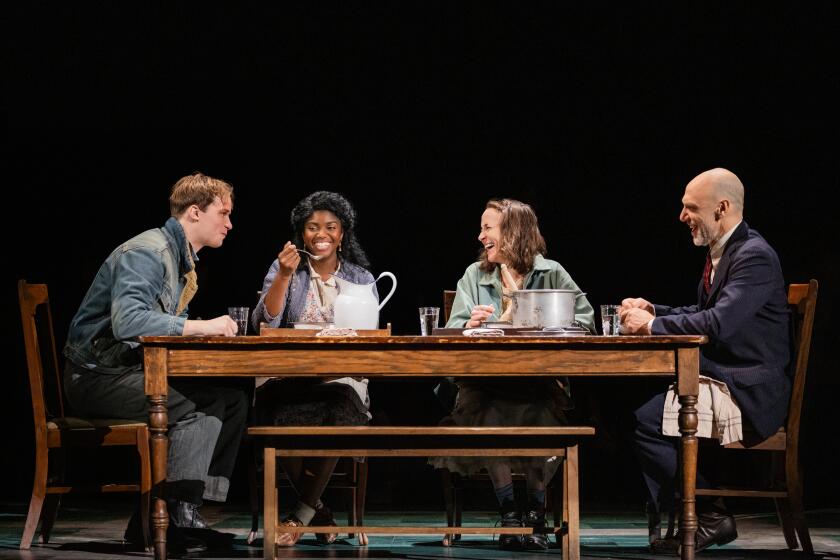Into a higher realm
AT least in English, it’s hard to find a bad review of Violeta Urmana, currently the recipient of raves for her passionate performance in the title role of Los Angeles Opera’s “Tosca,” which will conclude its run Thursday and next Sunday at the Dorothy Chandler Pavilion.
True, a few quibbles turn up. David Mermelstein, assessing the production for the Los Angeles Daily News, found Urmana’s voice acceptable but her performance lacking in “flair and magnetism.” Daily Variety critic Alan Rich, on the other hand, deemed her L.A. Opera debut “stunning,” writing that she delivered “white-hot drama in voice and in person,” and Times reviewer Chris Pasles called her “staggering in her vulnerability,” adding, “ ‘Heartfelt’ is a meager word to describe her ‘Vissi d’arte.’ ”
With love letters like those, no Tosca is going to fling herself off a parapet over a perceived paucity of flair.
Indeed, for the last several years, the gushing about Urmana has been occurring on a grand scale. In 2002, the San Francisco Chronicle’s Joshua Kosman wrote that with her “musical brilliance and theatrical force,” she “single-handedly kick-started a performance of Verdi’s ‘Don Carlos’ that had been spinning its wheels.” And this fall, New York Sun writer Jay Nordlinger swooned over her “long lines of regal sound” in a Metropolitan Opera “Ariadne auf Naxos,” as did the New York Times’ Anthony Tommasini, who opined that her performance as Ariadne rivaled that of the Metropolitan’s reigning queen of the Ariadnes, Deborah Voigt. Flair that.
So why do the black-haired Urmana’s blue eyes flash with fury when the topic of critics is brought up?
Well, not all critics, she acknowledges. Just a handful -- particularly in Germany and Austria. Urmana is loved, she says, in Spain, Italy and Britain. But with regard to some German-speaking opinion-mongers, she is like an Olympic figure skater with perfect 10s who blames her silver medal on that pesky 9.8 from the Russian judge.
It turns out that if Urmana seems a bit hypersensitive -- even for an opera star -- she has good reason. In 2000, she made a radical decision: to reinvent herself, from mezzo-soprano into soprano.
When you hear that performers have reinvented themselves in Hollywood, it usually just means that Tom Hanks is playing a bad guy, or Madonna has traded her metal brassiere for English tweeds. But in the opera world, changing from mezzo to soprano requires that a singer not only win over skeptical listeners but learn an entirely new repertoire. Few have done it successfully; Urmana cites Americans Grace Bumbry and Shirley Verrett.
The naysayers ask, “Why is she doing it? She was a good mezzo,” Urmana says in a conversation at the downtown apartment that is her temporary residence during her L.A. engagement and where her husband of five months, Italian tenor Alfredo Nigro, is offering tortellini from the tiny kitchen. Her response to the carping? “Excuse me, just sing one aria that I am singing -- you can’t be a mezzo and sing that. Some of them can’t digest that.”
Shy but opinionated
URMANA describes herself as a shy person who had to fight her introvert tendencies to pursue her chosen career. But she is anything but shy when expressing opinions about her own work.
“I am very critical of myself -- I think that I am singing fine, you know?” continues the mezzo turned soprano, who often records her performances so she can compare her own impressions with those of the critics. “If a soprano is not getting a high note, maybe it’s not so good. But for me, it’s not happening. I always get my high notes,” she says heatedly. “It’s not fair somehow. I read it, and it’s not fair.”
Maybe these critics, she adds, “would like to be the persons that, if it should go badly, if I should damage my voice in this change of repertoire, they would be the first to say it was not the right thing to do.”
Urmana, 44, admits that mezzos are sometimes consumed with soprano-envy “because normally the parts of the soprano are more important. There are not so many operas, except maybe ‘Samson and Delilah’ or ‘Carmen,’ where the mezzo has a principal part. But normally, in ‘Aida,’ ‘Tosca,’ so many operas, the soprano is more important.”
She adds, however, that her own reason for changing her tune, so to speak, had nothing to do with coveting star roles and everything to do with what a voice told her -- her voice. “For me, it’s clear: If I would remain a mezzo, singing these roles like Azucena in ‘Il Trovatore,’ I would damage my voice with these parts.”
A singer can’t be both a mezzo and a soprano, Urmana asserts. “Not for long. It is too heavy for me to sing these [mezzo] roles,” she says. “If today you are singing two notes that are not good, and you don’t pay attention to that, tomorrow it will be five notes.
“It is not so easy for me to sing all new repertoire. I’m not doing it for the money, because I was a good mezzo. I could have many contracts, singing everywhere. But my voice just wanted a definite change.”
A late beginning
URMANA began her musical education in her native Lithuania as a pianist. She did not start training as a singer until age 26.
“I was sick for opera since I was 16, but I waited 10 years,” she says. Her idol was Maria Callas. “Maybe it’s the power of her emotion, the deep understanding of the role,” she muses. “Her voice was not really very beautiful, but it was maybe also more expressive.”
When she began studying singing in Lithuania, Urmana says, her teachers soon dubbed her a mezzo because they perceived a dark quality in her voice. The mezzo label stuck when she left Lithuania in 1991 to study in Germany and, two years later, launched her professional career.
But although Urmana may have been singing the mezzo roles in “Don Carlo” or “Il Trovatore” onstage at the Met or La Scala, backstage in her dressing room she was singing along with recordings of great soprano roles.
“I just felt so free, so happy -- I had no problem doing this,” she says. “And in the year 2000, I felt it was impossible to keep going like that, to sing mezzo-soprano. I was singing Azucena at La Scala, and they were very happy, but I was not. I was crying in between. My voice doesn’t want this kind of singing. That’s when I decided it was time to change.
“My voice may be a little dark, but it has all that a soprano needs.”
Now -- except for those unnamed German critics -- the only problem for Urmana is that the soprano roles that best suit her voice aren’t in the same operas that suit the voice of her husband, a lyric tenor with whom she maintains homes in Munich, Germany, and the Puglia region of southern Italy. Although the pair share the names of famous operatic lovers Alfredo and Violetta in “La Traviata” (except for that spare “t”), their only opportunity to sing together is in concert.
Despite considering herself fully equipped to be a soprano, Urmana says there is one famous soprano role she’ll wait awhile to perform onstage: Brunnhilde from Wagner’s “The Ring.” Not because she can’t sing high enough, but because she believes she cannot yet sing loud enough.
“My voice must still become bigger,” she says. “Probably when I am over 50 I will do it with great pleasure, but not now.”
Some sopranos might push themselves to shout out a high note -- but not Urmana, the singer observes with just a hint of the diva in her voice. “A soprano can get an ugly high note,” she says. “But Urmana just ... should not.”
*
‘Tosca’
Where: Los Angeles Opera at the Dorothy Chandler Pavilion, 135 N. Grand Ave., L.A.
When: 7:30 p.m. Thursday, 2 p.m. next Sunday
Price: $30 to $205
Contact: (213) 972-8001 or www.laopera.com
More to Read
The biggest entertainment stories
Get our big stories about Hollywood, film, television, music, arts, culture and more right in your inbox as soon as they publish.
You may occasionally receive promotional content from the Los Angeles Times.






